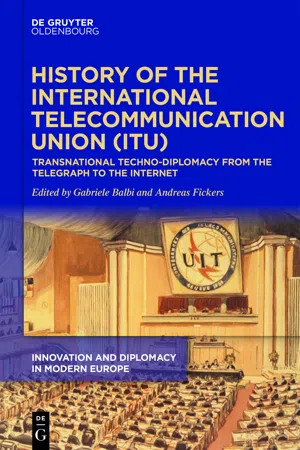The author would like to thank Gabriele Balbi and Maria Rikitianskaia for their comments on an earlier version of this chapter. This research, which grows out of a larger project on the telegraph in the Russian Empire, has benefitted from the assistance of Sergey Dobrynin, Anastasia Felcher, Monika Metykova and Victor Taki.
1.1 Introduction
Among the 20 participants at the first Paris meeting of the International Telegraph Union (ITU) in 1865 were representatives of the Habsburg, Ottoman and Russian Empires. These continental empires, with their extensive, land-based telegraph networks, had a large role to play in this first conference on the telegraphic harmonization of Europe.1 For no state was ITU participation more important than for the Russian Empire, however. Following its defeat by Britain, France and the Ottoman Empire during the Crimean War of 1853 – 1855, the Russian Empire under its new Tsar Alexander II sought to regain its place as one of the “Great Powers” of Europe.2 The Crimean defeat “exposed the obsolescence of Russia's military establishment and provided shocking evidence of the country's economic backwardness and the corruption of its civil administration.”3 Thrust into the leadership of Russia as the war was being lost, Tsar Alexander II faced the subsequent decades “as a military man who recognized the lessons of the Crimean War, and as an emperor for whom the prestige and greatness of the state took precedence over everything.”4
This chapter will focus on how the aims of the Russian Empire – to regain its status as a “Great Power”5 – fitted into the work and achievements of the International Telegraph Union in its early years. Combining perspectives from the history of technology, geopolitics and international relations, this chapter will build upon contemporary accounts of the telegraph conferences from Russian, French and American journals as well as from ITU documents and publications. After exploring the dynamics of technology and diplomacy in the Russian context, this chapter will illustrate how the period of Russia's “Great Reforms” in the decade following the Crimean defeat related to the development of Russian telegraphy. The chapter will then describe Russia's attendance at the first conference of the International Telegraph Union, their active participation as an ITU member, and their hosting of the seminal 1875 meeting in St. Petersburg. In conclusion, the chapter will address the ways in which Russian goals were realized at the 1875 St. Petersburg meeting and later assessed in terms of their legacy and contribution to international communication.
The chapter argues that Russia's technological and bureaucratic reforms after 1856 and their active participation in the first decade of ITU conferences helped to solidify Russia's central role in trans-border telegraphic communication to, from and outside of Europe. At the same time, Russian actors were able to demonstrate Russia’s Great Power status by contributing to what was then seen as the “civilizing discourse” of Europe, which was developing at concurrent European conferences aiming to codify the laws of war. Seeing the 1875 St. Petersburg Telegraph treaty in this context helps to interpret the conference achievements as well as their implications for the relationships between telegraph technology and geopolitics, between international diplomatic practices and national security concerns, and between the achievements of telegraph regulation and the strategies of its interpretation.
1.2 “Techno-Diplomacy” and the Russian Empire
Techno-diplomacy is a relatively recent concept dating from the late 1980s,6 a concept that came to prominence describing relations between imperial Russia's successor, the Soviet Union, and the West. Sharing of information about science and technology, even cooperating in space exploration, as it developed during the latter stages of the Cold War, suggested ways in which technological matters could be negotiated even when political circumstances were under strain.7 Such political circumstances among the European powers also obtained in the decades before and after that first ITU conference in 1865. Thus, not only the aftermath of the Crimean War but also the 1866 Austro-Prussian War and the Franco-Prussian War of 1871 posed challenges to the peaceti...
